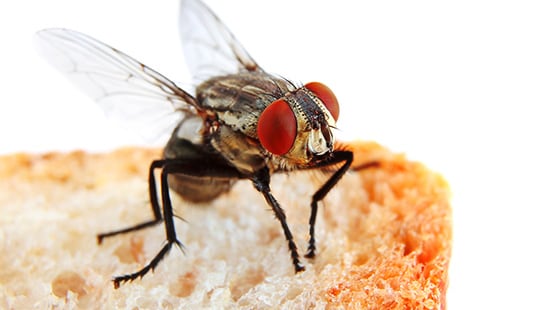Large Flies and Food Safety

Large flies, including house flies, blow/bottle flies, and flesh flies breed in places every restaurant has: Dumpsters and garbage. They also thrive in decaying vegetation.
Your employees might know the dangers of cockroaches in the kitchen but dismiss a house fly as they shoo it away. Little do they realize that large flies also pose a serious food safety risk. A fly has 6 million bacteria on its body and 25 million bacteria internally. Large flies have enormous potential to transmit bacteria and other potentially pathogenic organisms directly to food or food-prep surfaces, making commercial fly control a smart investment.
Besides being a nuisance, large flies can present a serious food-safety concern. Research has shown that houseflies can harbor more than 200 pathogens, including foodborne illness-causing bacteria, such as cholera, typhoid fever, diphtheria, dysentery, E. coli, Salmonella, and others. Their sticky feet and body hairs are ideal for collecting and holding bacteria. Because of this, even a single fly in your facility is a food safety risk.
Large flies landing on solid food items will often regurgitate digestive enzymes onto the food surface to dissolve the food allowing the fly to suck it back up. Flies will also deposit fecal matter on resting surfaces, leaving risks of contamination wherever they go.
Additionally, a fly that has been on filth such as garbage, decaying meat or outdoor feces can pick up pathogens and carry them onto a clean surface or ready-to-eat food product. Large flies can jeopardize your brand, and their presence could be an indicator of poor sanitation to an auditor or inspector. This can result in fines or even closure—putting your brand at risk.
Fly Risks

Magnified Head of Fly
Body hair can pick up and transfer disease organisms.

Magnified Mouth of Fly
Mouth has yellow and green E. Coli bacteria.

Magnified Feet of Fly
Flies' sticky feet are good at collecting and spreading bacteria.
How to Prevent Large Fly Problems
There are steps you and your pest management provider can take to protect your business from the threat of large flies and minimize food-safety risks.
Looking for a pest control provider to prevent, reduce and eliminate flies? Ecolab has the expertise you need.



